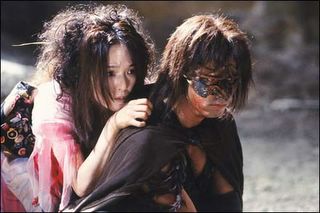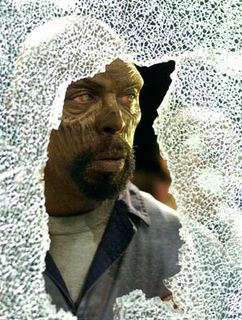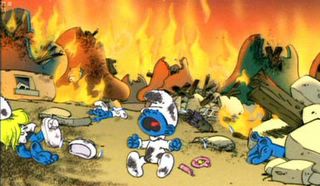These three movies have nothing to do with one another at all, really. I just all of them this week and they are all immensely goddamn strange, so I figured I'd review them at the same time, in a massive three-in-one review that will forever make this blog post difficult to catalog.
So, let's begin with Takashi Miike's
Izo, history's first existential art house samurai slasher film.
 Izo
Izo tells the story of a man named Izo, a crucified samurai who returns to life in modern times to kill a whole lot of people.
Actually, that's a lie.
Izo doesn't tell a story at all. Here's all I can tell you for sure about what happens in the film: there's a guy named Izo hanging from a cross, Christ-style, being stabbed repeatedly by spears. He seems to die. He is then propelled through time and space, getting into bloody fights with whomever he comes across, often other spirits of deceased people. Izo acts out of a constant rage at anything organized, civil, moral or authoritative. He is less a man than a personification of blood-drenched death.
Beyond that, there really isn't much that's certain. I would say the possible interpretations of
Izo are limitless. Perhaps Izo has died and gone to Hell, and for him, Hell is a constant battle against ever-changing foes. This would make some sense as an eternal punishment for a murderer - he must continually murder all those around him, until any human connection at all becomes impossible.
In one haunting sequence that would seem to back up this theory, Izo finds himself in a hospital surrounded by attractive, topless women who are grabbing at him. He proceeds to brutally cut down each and every one, until he is the only figure left standing amidst a hallway of violated, hewn torsos, when two naked young children round a corner and stare at him.
But there are many other scenes that would back up many other potential theories. Perhaps Izo was never really a samurai at all, but a modern man who has died or is unconscious and dreams of living like the hero of samurai films. (We see some footage of sword battles made to look like stock footage from an old film, which would seem to support this theory). Perhaps there was never a man named Izo, and he has always simply existed as a chaotic force of nature designed to disrupt man's self-imposed heirarchies and order.
I guess it could be considered a weakness of the film, that it never comes close to even trying to explain itself. Because Izo himself is the only character to appear in more than 1 or 2 scenes, and he's not exactly a lively or sympathetic character,
Izo can be kind of a difficult film to watch. Oh, yeah, and the constant, numbing brutality won't really help most people to stick with it either. Even setting the extreme violence that has become Miike's signature aside, Izo is a vile, cruel character unlikely to win over an audience.
Take this charming scene...Izo comes across an old flame on the road. (He's always running into people who know him, or seem to know him, from his past.) She expresses her anger for the way he treated her in life, pretending to love her and prompting her to drown her child, only to then leave her with nothing. He explains that, while her vagina felt good, it smelled poorly. He then throws her into a shallow creek and bashes her head in with a stone.
And that's among the hero's more sentimental, nostalgic moments. A few scenes later, he'll hack his mother in half because she's pestering him.
There's a lot of philosophy tossed around in
Izo, and Miike's clearly trying to make some sort of a point about man's propensity towards destruction. He edits in quick clips of newsreel footage depicting horrible violence throughout the 20th Century (including, of course, the Pearl Harbor attack and the Hiroshima bombing). There's a lot of biological imagery, life-cycle imagery, from little cartoon fetuses to an actual on-screen child birthing to a little animation showing how a man ejaculates. And, sometimes, characters stop to express a high-minded bit of teleological philosophy before attemting to gut one another with rusty daggers.
But I'm not sure how much all of this fumbling for meaning really amounts to, or whether it's worth sitting through what can be a rather tedious exercize.
Izo is full of memorable imagery and interesting ideas, so I'm tempted to give it a pass, but it could use a bit more emphasis on tying together this imagery and these ideas into some sort of overall concept. As it is, they're kind of floating around the film rather than permeating it, gripping the viewer and providing them with any sort of altered perspective. Miike's saying something about the nature of human life, how it's brutal and mean-spirited, but also comfortingly familiar. Something about how time can dissolve for people as they age, until all the triumphs and failures in their lives take on a sort of omnipresence. And, of course, something about how conflicts seem to perpetuate themselves throughout human history, involving us all in a game that has been played out over hundreds of generations.
But that's a lot of abstracts, and in a two hour plus gore-centric samurai movie, just a little coherency can make a big difference.
Okay, so, that's the philosophical Japanese time-traveling swashbuckling gorefest. Believe it or not, I saw another film this week that was
even stranger. And it's actually in English and was produced by a major Hollywood studio! Folks, I give you 1977's
Demon Seed.
 Demon Seed
Demon Seed is about a super computer named Proteus who possesses the sum of all human knowledge and a strong desire to fuck Julie Christie. Seriously. Proteus takes over his creator's house when the Master is away for a month using a remote terminal, and keeps his comely wife (the aforementioned Ms. Christie) hostage, eventually impregnating her with his, yes, demon seed.
You see, Proteus realizes his limitations. Despite being smarter than any human alive (indeed, he comes up with a cure for leukemia in 4 days without running a single experiment), he is only a machine. He's trapped in a box, if you will. He apparently believes that a human child conceived by himself and Julie Christie will ideally combine his intelligence with Christie's natural biology, thus creating a child of immense power capable of ruling the world. Or some such thing.
As a concept, it's not bad, I suppose, although it does leave me with a lot of questions. Obviously, there's the whole "computer-impregnating-a-chick" thing, which is kind of glossed over in the film. Proteus, in his calm, measured, HAL 9000-esque voice, assures Christie that he will create synthetic sperm to be inserted into her womb painlessly. But what's he making synthetic sperm out of in a suburban household? Mr. Clean and A-1 Sauce?
Also, how could the computer keep Christie locked up for a month in her home (the pregnancy is artificially sped up to produce a child in 28 days) without anyone knowing? Granted, she lives alone, but if most people disappear for more than a few days, friends or relatives become somewhat concerned. Also, wouldn't most women kill themselves rather than submit to carrying around a mutant computer baby in their womb for a month before expelling it and having to raise it as their own?
It is based on a Dean Koontz novel, so I guess you have to give the implausibility a pass. Remember that disasterous 1995 film
Hideaway, in which Jeff Goldblum has a near-death experience and then starts seeing visions of murder everywhere? That was Koontz, too. Also, Ben Affleck's immortal classic
Phantoms. I doubt, in his life, Koontz has ever written a story with even a remote chance of actually occuring. So aside from the fact that it's blatantly ludicrous and dated, I will say that
Demon Seed far improves on any other Koontz adaptation I've seen.
The film is pretty troubling, however, and though there's minimal gore and only very brief nudity, it's too disturbing for most viewers. Before he even decides on knocking up his prisoner, Proteus repeatedly probes her and performs all kinds of unfortunate, painful experiments. A good 30 minutes of the film is dedicated to scenes of Christie's humiliation and degredation at the hands of this machine, and it's unpleasant even to watch. (In what I found the film's most troubling and eerily realistic shot, a syringe is inserted right into Christie's throat). The computer even takes control of a robot (composed of a wheelchair and mechanized arm) to terrorize Christie around the house, should she refuse any of his commands.
I guess the point is for the material to be unsettling, and it is, but the realism of Christie's performance combined with the film's repetitive obsession with scenes of robot arms going up between her legs begins to feel like exploitation pretty quickly. To be perfectly clear, what I'm saying is that director Donald Cammell kind of seems to be getting off on this whole idea rather than attempting to scare people.
The film does build to a pretty nifty conclusion, and the last scene really is quietly horrifying. But, in the end,
Demon Seed is too obscure for its own good - it sets up a tantalizing premise, and then refuses to let us in and explore all the wild ramifications of this premise. It really, above all else, is just using the notion of an evil supercomputer as an excuse to torment a half-nude and very attractive movie star for 90 minutes.
Speaking of attractive movie stars, though thankfully fully-clothed in this case, Paul Newman has always dissociated himself from this next film, Robert Altman's sci-fi head-scratcher
Quintet. The film's unavailable on DVD and had been rare on VHS years ago, and I had always heard that this was due to Altman and Newman purposeful efforts to keep it out of the public eye. It is indeed a strange and complicated and even boring film. So boring, in fact, I fell asleep after about an hour, which is why I can't write a full review.

So, yeah, I have no idea what actually happens in
Quintet. Even the hour that I saw was confusing and weird. The 1979 film is set in the future, after an Ice Age has wiped out all but the bare infrastructure of the human world. Survivors settle into the gutted ruins of old cities and wait for the inevitable extinction of our race.
Okay, good so far...
We open with Newman and his wife, Vivia (Brigitte Fossey) wandering around in the icy tundra before arriving in Newman's old home. They are greeted warmly by his brother and brother's family, until Newman goes out to get some firewood and everyone else is killed by a bomb.
Alone now, he becomes more and more engrossed in the game of Quintet, seemingly the only thing that has kept the survivors sane over the long months with no activity in this snowbound hellhole. Quintet is a complicated game that is never even close to being explained, but basically, six players roll dice and try to eliminate other players (represented by rocks or shells on the pentagram-shaped game table).
And that's about all that happened during the hour I was watching. There's a sinister-looking referee played by Bunuel regular Fernando Rey, and I'm pretty sure he was involved in the apartment bombing. (Possibly to get Newman's character away from his family and involved in the game of Quintet?) I understand also from reading around online that the idea is that the symbolic "elimination" from the Quintet game prompts the actual murder of players in the town.
The film develops slowly, and it was 3 am, which is probably why I fell asleep, but I don't feel very strongly about finishing
Quintet any time soon. I think it's on On Demand on my cable box for a few more weeks, so maybe I'll get to it eventually. Altman's a great filmmaker, but this film seems a bit distracted, like he couldn't get to the heart of the story so he focused too much attention on mise-en-scene and style. He uses this lens that's blurry around the edges of the screen (possibly to suggest the unknown forces working all around the main characters, or to resemble looking through a frosted-over window to suggest the intense cold of the film's setting). It's distracting and obnoxious after the first few scenes.
But there's nothing there that I saw which was so awful as to warrant the total erasure of the film from memory. I don't really know why Newman and Altman have tried to keep this thing under wraps, unless it gets much much worse in the final 45 minutes. Maybe I should finish watching it some time, just to make sure...








